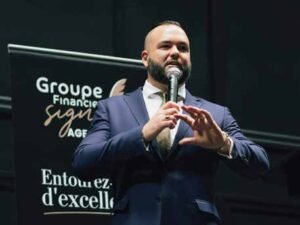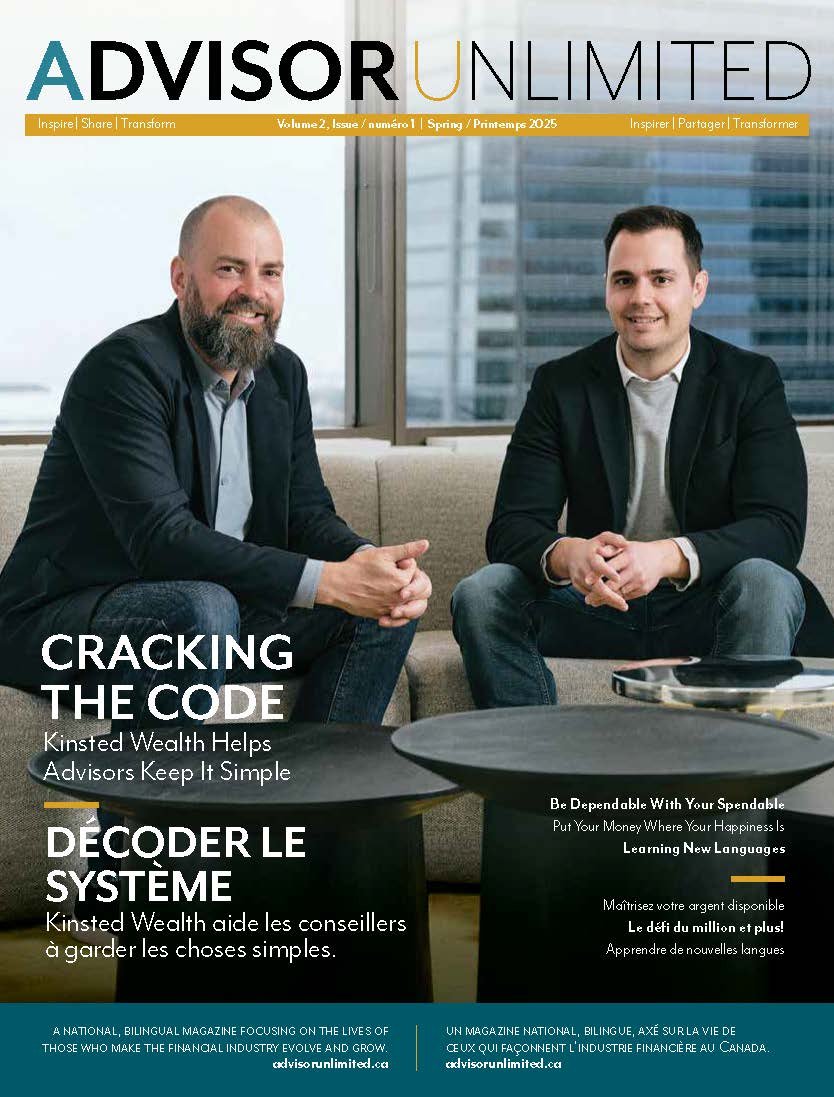
From the Editor: Geoff Kirbyson

Have you ever wanted to block out pretty much everything that’s going on in the stock markets as much as you do today? A lot of observers have described the stock market ride since Donald Trump moved back into the White House in January as a roller coaster, but I disagree. I think it’s been more of a Drop of Doom. You know the midway thriller where you’re strapped into an open-air gondola with over-the-shoulder restraints and you slowly climb to the top of a tower, sit there with your feet dangling for what seems like an eternity, and then free-fall for five seconds?
Personally, I prefer my stomach to not be in my throat. Maybe that’s just me. Considering our goal is to focus primarily on stories about people, lifestyle, entrepreneurship and innovation rather than products, issues or brands, let’s ignore the trade war and the unpredictability of it all.
Instead, let’s go to school on Jack Wozniak. The Regina-based advisor has found a second wind in his practice after starting to learn Japanese, even though it hasn’t led to a single new client.
If the Drop of Doom is your thing, you’ll want to read about Stephanie Holmes Winton in Halifax, perhaps the only financial expert in Canada who is just fine with lighting money on fire.
Our cover story focuses on Dave Wilder, the Calgary-based financial planner who believes he has “cracked the code” with his partnership with Kinsted Wealth.
We hope you enjoy our latest issue of Advisor Unlimited and we welcome any feedback and ideas that you have.
Geoff
Be Dependable With Your Spendable

Stephanie Holmes Winton might be the only financial expert in Canada who advises people to light money on fire.
Well, not literally.
But the founder and CEO of CacheFlo, a behaviour based financial literacy company in Halifax that helps people act on what they learn about money, is fine with taking a figurative torch to legal tender. Some of it, anyway.
“We show a person or family how much it’s safe to spend on the things they can control every week. We always have a little bit of money every week that we don’t have to be accountable for. So, if we light it on fire and dance around it, it’s
nobody’s business,” she says.
“If I want to go to Starbucks for coffee, that’s cool, and if my husband (Ric) wants to order CDs from Australia, that’s cool, too,”
CacheFlo creates education and technology that helps people and financial professionals manage their cash flow and debt as efficiently as possible.
The software generates a “spendable” amount and clients are instructed to set up a separate bank into which it will flow. The crucial element, however, is once the spendable money is gone, it’s gone.
Put Your Money Where Your Happiness Is

The number of advisors who have traded in a seven figure income for the chance to overhaul the financial services industry can probably be counted on one hand.
Or perhaps just a single finger.
But it wasn’t about the money for Louis- Xavier Savard, president of Signature Financial Group, when he changed course two years ago.
“At some moment, you’re not driven by the money,” the 35-year-old says from his office in Valleyfield, Quebec.
“It’s what makes you happy. You need to be happy with what you’re doing and giving advice to clients was’t making me happy.”
So, he decided to become a general agent, the intermediary between advisors and providers of insurance and mortgages, and pay himself a management salary.
“We build partnerships with insurance companies and banks and then we allow the advisors to access their products,” he says. A noble endeavour, to be sure, but some of his friends and family wondered if he had lost his mind. He quickly assured them he was fine — he was simply trying to make the financial services sector better for both participants and clients, alike.
CRACKING THE CODE
Kinsted Wealth Helps Advisors Keep It Simple

After more than a decade in the financial services sector, Dave Wilder has finally found the perfect solution for his clients.
And himself.
The Calgary-based financial planner at Lantern Wealth partnered with Kinsted Wealth in 2022 and hasn’t looked back.
“I feel like I’ve cracked the code,” he says.
Kinsted was founded in 2003 with one primary goal in mind — keep wealth management simple. The independent wealth manager, which serves private individuals and institutional investors, builds tailored investment strategies and blends traditional and alternative asset classes, including infrastructure, private credit, private equity, real estate, music royalties, agriculture and public markets, to deliver long term growth and capital stability.
Kinsted’s team of wealth counsellors determine the appropriate mix of assets needed to achieve client target returns with the least amount of risk. The investment strategy is then constantly monitored and refined, which frees up advisors’ time that can be put towards financial planning and client relationships.
For Wilder, the partnership has enabled him to outsource investment management, compliance, and administrative work to a reputable firm while still owning his business. Of course, he continues to be the main point of contact for his clients.
“I sit on the same side of the table as my clients. I’m more of an advocate for my clients than I am just referring someone off and letting it go. I have independence but I have a team to fall back on,” he says.
FROM THE PUBLISHER'S DESK
Licenses lead to sales, credentials lead to advice

In Canada’s wealth management industry, most financial advisors have entered the industry the same way they exit it — with a mutual fund license (CIRO, formerly MFDA) or an investment securities license (CIRO – formerly IIROC). Why? It’s just the way things have been done for decades now. Product manufacturers (mutual funds, for example) and dealers/distributors have needed a sales force to push their products, and this was and has been the way to do that in a professional way.
When I decided, in 2020, to leave a captive dealership to build New Outlook Wealth, I knew things had to change. If I was going to be putting my career on the line, the juice had to be worth the squeeze. Launching just another wealth or advisory firm was not going to cut it. I learned after 20 years in the insurance and financial services industry and being licensed to sell, that the way Canadians were being served was deeply flawed. For the most part, that has not changed and in some ways, it’s only worsened in the last 5 years. So we needed to be different, and work to overcome these flaws once and for all. The key differentiator from Day 1 for my firm and its people has been this very simple, yet surprisingly powerful, idea of separating financial advice from investment management.
Learning New Languages
WHO SAYS YOU CAN’T TEACH AN OLD ADVISOR NEW LANGUAGES?

Jack Wozniak didn’t pick up Japanese to win clients — in fact, he hasn’t gained a single one from it. But the language has sparked a surprising transformation in his career.
Based in Regina, Wozniak is a financial advisor with New Outlook Wealth and a longtime ambassador for Rotary International. Through Rotary, he helps run a cultural exchange program that brings Grade 12 students from southern Saskatchewan into contact with peers from around 40 countries, including Brazil, Sweden and Japan.
While many of these international students speak English, some struggle — especially the quieter ones from Japan. Wanting to help them feel more at home, Wozniak began learning Japanese. His dedication took him all the way to Japan, where he spent a month studying
at a local school and visiting rural communities. He’d wander into shops, introduce himself and try his best to chat in their native tongue.
“Japanese is one of the hardest languages to learn,” he says. “But the kids love it when you try. Even just knowing a little surprises them. They were absolutely stunned,” he says, laughing.
He rates his own fluency as a humble three out of 10. But for Wozniak, it’s not about perfection — it’s about connection.
“I thought that if I learned some Japanese, I could help them feel more comfortable,” he says. “When students feel out of place, they can become withdrawn. They stay in their rooms and it becomes hard to have a real exchange. We want to draw them out and make sure they’re experiencing life here.”
For many international students, the program offers more than just adventure — it gives them an edge. Wozniak says that including English and time abroad on their résumés sets them apart in their home countries, even if it means taking an extra year to finish high school.
Expert Advice
How financially agile are your clients?
By STEPHANIE HOLMES-WINTON

What is financial agility? It’s your clients’ ability to handle life’s bumps in the road without ending up in the ditch. This is why working with clients on debt and cash flow is so incredibly important. Dealing with the volatility of assets and the complexity of insurance is one thing, but your clients’ debt and cash flow can have a compounding effect on any difficulties brought by those other areas of their finances. It’s all connected.
TEST YOUR CLIENTS’ FINANCIAL AGILITY USING THE FOLLOWING QUESTIONS.
1. Can you handle losing one income? For how long?
2. What happens to our cash flow if interest rates increase by 3%? (This number isn’t unreasonable and, in fact, I bet lots of people probably wished they’d been asking themselves this a few years ago.)
If you or your clients don’t have the answers to those questions built into the plan they have with you, they could bob when they should weave and end up face down in the dirt.
Expert Advice
Empower Your Clients: The Critical Role of Financial Literacy

As a financial advisor, your role extends well beyond managing portfolios, offering insurance solutions and planning for retirement.
In an increasingly complex financial landscape, one of the most impactful ways to add value and differentiate yourself is by enhancing the
financial literacy of your clients and prospects. Financial literacy is the foundation upon which sound financial decisions are made. When clients understand the basics of investing, budgeting and retirement planning, they are better equipped to navigate financial challenges and seize opportunities. Here are several reasons why boosting financial literacy amongst your clients is essential:
Informed Decision-Making
Clients who understand financial concepts can make more informed decisions, leading to better financial outcomes. This reduces the likelihood of misunderstandings and misaligned expectations.
Client Empowerment
Educated clients feel more confident and in control of their financial futures. This empowerment leads to greater satisfaction and trust in their advisor’s recommendations.
Reduced Anxiety
Financial matters can be a significant source of stress. By educating clients, you help alleviate their anxiety, making them feel more secure about their financial plans.
Long-Term Relationships
Financial literacy fosters a deeper, more collaborative relationship between you and your clients. This bond is crucial for long-term client retention and loyalty.















